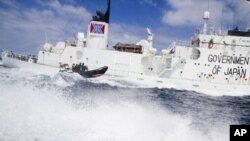After claiming victory against Japanese whalers in the Southern Ocean that encircles Antarctica, members of the Sea Shepherd Conservation Society have returned to the Australian port of Hobart. Last week the whaling fleet abandoned its annual hunt for a second year in a row.
Sea Shepherd activists say they have won a decisive victory against the Japanese fleet, which caught less than 30 percent of its annual quota.
For almost a decade the U.S.-based anti-whaling group has tracked the whalers into the Southern Ocean, in an attempt to disrupt their hunt.
This season’s campaign was called Operation Divine Wind, after the Japanese Kamikaze pilots of the World War II.
The Sea Shepherd ship the Bob Barker sailed into Hobart to a small crowd early Wednesday. Onboard were 28 volunteer crew members, half of them Australian.
They hope that economic losses will soon force Japan to end its controversial hunt in Antarctic waters.
The captain of the Bob Barker, Peter Hammarstedt, says he was surprised how quickly the Japanese abandoned their activities when they were spotted.
"For us it was not an incredibly dramatic confrontation. As soon as the Nisshin Maru, which is the factory whaling ship, saw us on the horizon that is when they decided [to] immediately change course for Japan and they have been heading home ever since," he said.
"This year, the Japanese whaling fleet decided that rather than have confrontation with us they would call the whaling season short, and as a result we were able to save 768 whales from slaughter."
Japan’s Fisheries Agency denies the whaling ships were bullied by activists and insisted they left the Southern Ocean “as scheduled." The fleet ended its annual hunt with a third of its intended haul.
The Institute of Cetacean Research, which sponsors Japan's whaling activities, has accused Sea Shepherd activists of trying to sabotage its factory ship, the Nisshin Maru, by hurling ropes with hooks attached and throwing glass bottles of paint.
Commercial whaling has been outlawed for 25 years, but Tokyo has an intention to catch about 1,000 whales annually in what it says is a scientific research program.
The Australian government welcomed the early end to Japan’s whaling season. Canberra says the hunt is against international law, which is why Australia is continuing legal action to try to stop the annual hunt in the International Court of Justice.





